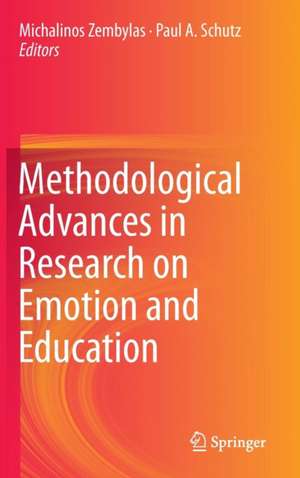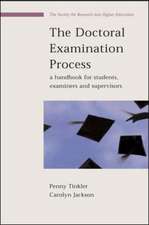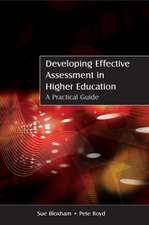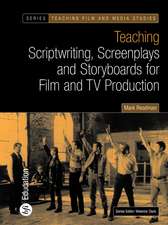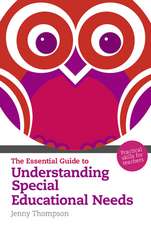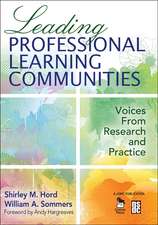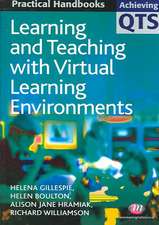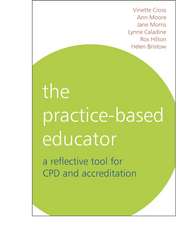Methodological Advances in Research on Emotion and Education
Editat de Michalinos Zembylas, Paul A. Schutzen Limba Engleză Hardback – 22 mar 2016
| Toate formatele și edițiile | Preț | Express |
|---|---|---|
| Paperback (1) | 1151.57 lei 43-57 zile | |
| Springer International Publishing – 25 apr 2018 | 1151.57 lei 43-57 zile | |
| Hardback (1) | 1192.31 lei 43-57 zile | |
| Springer International Publishing – 22 mar 2016 | 1192.31 lei 43-57 zile |
Preț: 1192.31 lei
Preț vechi: 1454.03 lei
-18% Nou
Puncte Express: 1788
Preț estimativ în valută:
228.17€ • 236.77$ • 190.71£
228.17€ • 236.77$ • 190.71£
Carte tipărită la comandă
Livrare economică 17-31 martie
Preluare comenzi: 021 569.72.76
Specificații
ISBN-13: 9783319290478
ISBN-10: 3319290479
Pagini: 419
Ilustrații: XIV, 299 p. 9 illus. in color.
Dimensiuni: 155 x 235 x 19 mm
Greutate: 5.97 kg
Ediția:1st ed. 2016
Editura: Springer International Publishing
Colecția Springer
Locul publicării:Cham, Switzerland
ISBN-10: 3319290479
Pagini: 419
Ilustrații: XIV, 299 p. 9 illus. in color.
Dimensiuni: 155 x 235 x 19 mm
Greutate: 5.97 kg
Ediția:1st ed. 2016
Editura: Springer International Publishing
Colecția Springer
Locul publicării:Cham, Switzerland
Public țintă
ResearchCuprins
I. Introduction.- 1. Introduction to Methodological Advances in Research on Emotion and Education, MichalinosZembylas and Paul A. Schutz.- II. Early Work and Reflections on ResearchingEmotions in Education.- 2. Interviewwith Megan Boler: From ‘Feminist Politics of Emotions’to the ‘Affective Turn’, MeganBoler (with Michalinos Zembylas.- 3. TheEmotional Dimension in Teachers’ Work Lives: A Narrative-BiographicalPerspective, Geert Keltchtermans.- 4. Using Self-Report to Assess Emotionsin Education, Reinhard Pekrun.- 5.Understanding and Planning Emotions Research, Christopher Day and BelindaHarris.- III. Affective Terrains While Conducting Research on Emotion inEducational Contexts.- 6. Gauging the Affective: Becoming Attuned to Its Impactin Education, Megan Watkins.- 7. Navigatingthe Emotional Terrain of Research: Affect and Reason by Way of Imagination, Kathleen Gallagher.- 8. ContemplativeEngagement with Emotion: Embodied Strategies for Transformation and Change, AmyWinans and Elizabeth Dorman.- 9. Emerging Emotions in Post-structuralParticipant Ethnography in Education, Maija Lanas.- IV. Foregrounding Conceptualand Theoretical Frameworks While Researching Emotion in Educational Contexts.- 10.Emotions as Situated, Embodied, and Fissured: Methodological Implications ofThinking with Theories, Candace Kuby.- 11. Emotion as Mediated Action in DoingResearch on Learning, CynthiaLewis and Anne Crampton.- 12.Emotional Geographies and the Study of Education Spaces, Peter Kraftl.- 13.Measuring Affect in Educational Contexts: A Circumplex Approach, LisaLinnenbrink-Garcia, Stephanie V. Wormington, and John Ranellucci.- 14. Where Race, Emotions and Research Meet:Moving Towards a Framework of Race Critical Researcher Praxis.- KeffrelynBrown.- 15. A Political Ethics of Care Perspective in Researching Emotions, VivienneBozalek, 16. Affect Theory and Judith Butler: Methodological Implications forEducational Research, Michalinos Zembylas.- V.Foregrounding Research Methods While Investigating Emotions in EducationalContexts.- 17. Using Multiple and Mixed Methods to Investigate Emotions inEducational Contexts, Paul A. Schutz, Jessica T. DeCuir-Gunby, and Meca R. Williams-Johnson.-18. Interdisciplinary Research Methods Used to Investigate Emotions withAdvanced Learning Technologies, Roger Azevedo, Michelle Taub, Nicholas Mudrick,Jesse Farnsworth, and Seth A. Martin.- 19. Assessing Academic Emotions via theExperience Sampling Method, Thomas Goetz and Madeleine Bieg.- 20. `ExploringEmotions at School with Children: Reflections on the Role of the Visual and Performativein Engaging with Children’s Constructed and Embodied Meanings of Emotion, LisaProcter.- 21. Researching Emotion Through Oral Histories of Educational andPersonal Change: Memory and Teacher Narratives, Julie McLeod.- VI. A FutureAgenda for Research Methods on Emotions and Education.- 22. Where Do We Go From Here? Implications and Future Directionsfor Research Methods on Emotion and Education, Paul A. Schutz and Michalinos Zembylas.
Notă biografică
Michalinos Zembylas is Associate Professor of Educational Theory and CurriculumStudies at the Open University of Cyprus. He is also Visiting Professorand Research Fellow at the Institute forReconciliation and Social Justice, University of the Free State, South Africa. He has writtenextensively on emotion and affect in relation to social justice pedagogies, intercultural and peace education, humanrights education and citizenship education. His forthcoming book is titled Emotion and Traumatic Conflict: Re-claiming Healing in Education (Oxford, 2015).
Paul Schutz is currently aprofessor in the Department of Educational Psychology at the University ofTexas at San Antonio. His research interests include the nature of emotion,emotional regulation, and teachers’ understandings of emotion in the classroom.He is a past president for Division 15: Educational Psychology of the AmericanPsychological Association and a former co-editor of the EducationalResearcher: Research News and Comment, a lead journal for theAmerican Educational Research Association.
Textul de pe ultima copertă
This volume presents different conceptual and theoreticalframeworks as well as research methods that have helped educational researchersto study emotions. It includes innovative approaches that push themethodological boundaries that have served educational researchers until nowand proposes new ways of researching emotions in educational contexts. In particular,this edited volume provides a historical frame for studying emotions. Itconnects theoretical/epistemological views with choice of research methods and describes specificmethods helpful in doing research on emotions as they are grounded in differenttheoretical and disciplinary traditions such as psychology, philosophy,sociology, history, political science, cultural studies, and feminist studies.Finally, it appreciates the contextual and international dimensions of studyingemotions in education and contributes to ongoing debates about the implicationsof our methodological choices for understanding emotion in education. Thiscombination of variety, timeliness, potential for transformation of the field,and uniqueness make this a very valuable resource to introduce new scholars inthe field alongside established scholars.
Caracteristici
First volume examining the impact of methodological choices on researching emotion
Discusses methodological complexities involved in doing such research
Synthesizes perspectives from different methodological and theoretical traditions
Includes supplementary material: sn.pub/extras
Discusses methodological complexities involved in doing such research
Synthesizes perspectives from different methodological and theoretical traditions
Includes supplementary material: sn.pub/extras
